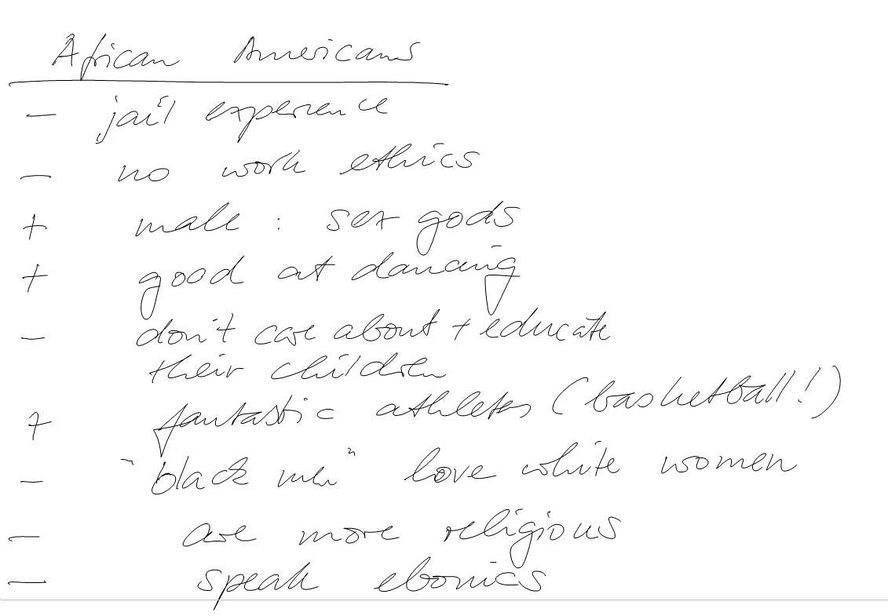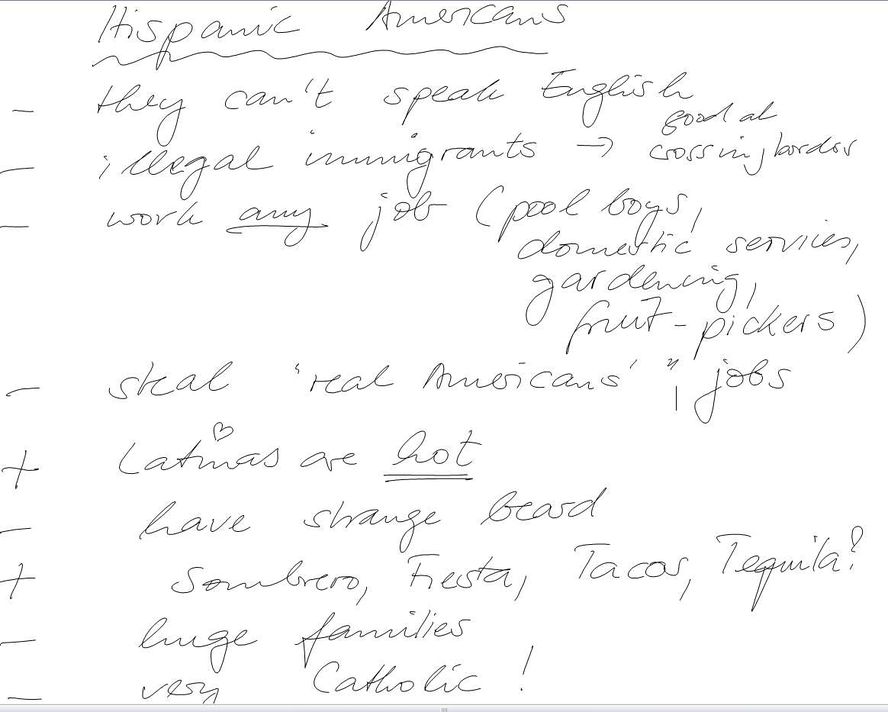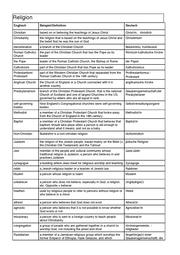Thelenberg 2011 12: Unterschied zwischen den Versionen
K |
K (→Discrimination) |
||
| Zeile 107: | Zeile 107: | ||
{{#ev:youtube|HbxMR3c2Pws |411}}<br> | {{#ev:youtube|HbxMR3c2Pws |411}}<br> | ||
| − | <u>'''Questions (Take notes!) Be ready to present your answers to the whole course in a 3-4 minute talk!</u> | + | <u>'''Questions (Take notes!) Be ready to present your answers to the whole course in a 3-4 minute talk!</u> |
* What is the EDL? | * What is the EDL? | ||
Version vom 21. Dezember 2015, 21:12 Uhr
|
Homework
Recent Homework
Von_Zuwanderern_lernen.zip Mediation herunterladen und mit Passwort entzippen!
Und wie gesagt: "Mediation ist ...! (Wer's Passwort vergessen hat: Mail an mich!)
Prepare a three minute talk on three negative effects of stereotypes:
Negative effects of stereotypes
(Cf. Wikipedia https://en.wikipedia.org/wiki/Stereotype,
Stereotype threat
The effect of stereotype ....
Self-fulfilling prophecy
Stereotypes lead people to expect ....
Discrimination
Because stereotypes simplify and justify social reality, ...
- Write 3 different beginnings/introductorx paragraphs for a comment on:
- Mass immigration can still be a chance for Germany
- Explain (orally) what kind of comment will follow (structure …)
- Interprete this cartoon!
- ICE means: U.S. Immigration and Customs Enforcement
- Look at this information!!! before you start to describe the content and analyse the cartoon!
- Email your analysis to joerg.thelenberg@gmx.de by Wednesday, 28th October!
B) Watch the clip (perhaps you need to watch it two or three times)!
Questions (Take notes!) Be ready to present your answers to the whole course in a 3-4 minute talk!
- What is the EDL?
- What did Mr Robinson, the leader of the EDL, surprisingly do?
- What are the reactions from his former supporters and his muslim opponents?
- What does this divide mean for British society (in your opinion)?
A) Answer questions 2 and 3 on the worksheet!
B) Watch the clip from 0:00 to 1:25!<b>
Questions (Take notes!)
- Who is interviewed?
- What is the question?
- What were his motives / are explanations for radicalization?
- Look at these statistics! and describe the situation of muslims in Britain on the basis of these data!
- If you are not sure how to work with statistics, see here!
- What effects does this have on the muslims' situation, attitudes and integration?
Just write down notes - NO FULLY WRITTEN OUT ANSWERS REQUIRED!
- Look at this information!!! before you start to describe the content of the cartoon!
- Describe the following cartoon (NOTES!)
Basic Skills & Information
- Information on homework and oral grades
- Reading and Marking technique - SQ3R Method A useful method to read, mark and annotate texts.
- Working with Cartoons
.
Muslims in Britain
Texts
- Problematic issues between British Muslims and the "Christian" majority
- A problem of perception: Muslims are well-integrated in Britain – but no one seems to believe it
- Reflections of a Former Islamist Extremist
- Read from beginnin to "And it's a very powerful grip on one's mind. And in my case it took years to shed that influence." (third box)
- Answers to book, p. 86/87 q. 5 + 6
- Why does a young muslim turn into an extremist?
- crucial event: death of thousands of European muslims in war in Bosnia in 90s! West just watches and doesn't help the muslims there. (Parallels to wars in Iraq .... muslims are being killed and no-one cares)
- Islam is cleverly presented as way of looking at history: like in Marxism it is always a struggle, them against us, bad against good, everybody against the muslims (idea of Western/Jewish conspiracy against Islam/muslims)
- at school/in university young muslims become part of an active, organized, outspoken movement ⇒ proud to be an active muslim, feeling of power, feeling of belonging to group and of changing the world.
Cartoon ⇐Klick!
- 4 frames, three show acts of violence/hatred committed in the name of Christianity/Western Civilization
- evangelical pastor [=church] burning Korans, evangelical/conservative politician [politics] against building mosque in USA, secret service agent [=government] torturing terrorist suspect)
- irony: they all want revenge/act as unchristian/intolerantly as those they accuse of doing this to them
- irony: preacher is completely stupid: of course "them folks don't act like Christians" - they simply aren't christians!
- preacher also doesn't seem to know his Bilble: "Jesus hates Mohammed" is absolutely like anthing Jesus preaches in the Bible: Jesus preaches love, peace and forgiveness - not hatred!
- picture four shows the result: children in USA have learned, that you needn't act as you wish others to act towards you (in civilized way, mercyfully, helpfully, tolerantly ...) but can do anything you want as long as nobody stops you.
- General criticism: christian/western preachers and politicians and governments do the same things they accuse terrorists and radical islamist of ⇒ they are no better than them
Stereotypes
Definition: Stereotypes
- ... are fixed, simple ideas or images that many people have of a particular type of person or thing
- ... often use simple criteria and give a simplified version of reality
- ... help us to categorize/distinguish between dangerous and harmless, attractive and unattractive, reliable - treacherous ...
- ... help us to understand and explain the world in a quick and simple way
- ... can be positive (men are strong) and negative (men don't have true feelings)
- ... are often very hard to change, even if experience suggests thtat the stereotype may be wrong/too simple to explain complex realties or individual behaviour
Effects of Stereotypes
(from Wikipedia https://en.wikipedia.org/wiki/Stereotype,
Stereotype threat
The effect of stereotype threat (ST) on math test scores for girls and boys. Data from Osborne (2007).
Stereotype threat occurs when people are aware of a negative stereotype about their social group and experience anxiety or concern that they might confirm the stereotype. Stereotype threat has been shown to undermine performance in a variety of domains.
Claude M. Steele and Joshua Aronson conducted the first experiments showing that stereotype threat can depress intellectual performance on standardized tests. In one study, they found that black college students performed worse than white students on a verbal test when the task was framed as a measure of intelligence. When it was not presented in that manner, the performance gap narrowed. Subsequent experiments showed that framing the test as diagnostic of intellectual ability made black students more aware of negative stereotypes about their group, which in turn impaired their performance.
Stereotype threat effects have been demonstrated for an array of social groups in many different arenas, including not only academics but also sports, chess and business.
Self-fulfilling prophecy
Stereotypes lead people to expect certain actions from members of social groups. These stereotype-based expectations may lead to self-fulfilling prophecies, in which one's inaccurate expectations about a person's behavior, through social interaction, prompt that person to act in stereotype-consistent ways, thus confirming one's erroneous expectations and validating the stereotype.
Word, Zanna, and Cooper (1974) demonstrated the effects of stereotypes in the context of a job interview. White participants interviewed black and white subjects who, prior to the experiments, had been trained to act in a standardized manner. Analysis of the videotaped interviews showed that black job applicants were treated differently: They received shorter amounts of interview time and less eye contact; interviewers made more speech errors (e.g., stutters, sentence incompletions, incoherent sounds) and physically distanced themselves from black applicants. In a second experiment, trained interviewers were instructed to treat applicants, all of whom were white, like the whites or blacks had been treated in the first experiment. As a result, applicants treated like the blacks of the first experiment behaved in a more nervous manner and received more negative performance ratings than interviewees receiving the treatment previously afforded to whites.
A 1977 study by Snyder, Tanke, and Berscheid found a similar pattern in social interactions between men and women. Male undergraduate students were asked to talk to female undergraduates, whom they believed to be physically attractive or unattractive, on the phone. The conversations were taped and analysis showed that men who thought that they were talking to an attractive woman communicated in a more positive and friendlier manner than men who believed that they were talking to unattractive women. This altered the women's behavior: Female subjects who, unknowingly to them, were perceived to be physically attractive behaved in a friendly, likeable, and sociable manner in comparison with subjects who were regarded as unattractive.
Discrimination
Because stereotypes simplify and justify social reality, they have potentially powerful effects on how people perceive and treat one another. As a result, stereotypes can lead to discrimination in labor markets and other domains. For example, Tilcsik (2011) has found that employers who seek job applicants with stereotypically male heterosexual traits are particularly likely to engage in discrimination against gay men, suggesting that discrimination on the basis of sexual orientation is partly rooted in specific stereotypes and that these stereotypes loom large in many labor markets.[14] Agerström and Rooth (2011) showed that automatic obesity stereotypes captured by the Implicit Association Test can predict real hiring discrimination against the obese.[74] Similarly, experiments suggest that gender stereotypes play an important role in judgments that affect hiring decisions.
Sterotypes against Asian Americans
What stereotypes about Asian Americans are there? Make a structured list (sex, positive/negative ...)
- Men
- + clever, hard working
- + technology-freaks, good with computers
- - nerds
- - not masculine/effeminate
- - not athletic
- - short
- Women
- + exotic (sexually attractive)
- + clever, hard working
- + submissive/demure
- - too clever(for many men), tricky
... against African Americans
Positive or negative ..? - what effects?
... against Hispanic/Latino Americans
Positive or negative ..? - what effects?
Multiculturalism - Does it work?
Facts
The ideal of multiculturalism: Pros and Cons
Book p. 51
- Multiculturalism is a failure as it leads to segregation and lack of assimilation into British culture
- Ghettoization and lack of intermarriage speak a clear language ⇒ no assimilation of some ethic groups
- Criticism of multiculturalism is not not racism, but an expression of the mainstream culture's efforts to defend against all otherness
- Not only immigrants, but all groups and classes live and socialize preferrably with people of a similar social type
- Most Britons think: Not mixing is okay as long as it doesn't threaten society, as long as general acceptance of British laws and culture is not in danger
Immigration
Buch 64/65 (Q 1): Typical features in lives of immigrants
- belief in American dream (job, house, provide for family)
- (parents) came to USA to have more opportunities/due to poverty in home country
- work
- first jobs in agriculture (fruit picking) or fast-food sector, textile industry
- children often have to work with parents
- often migrant workers
- often non-permanent, short-term employment
- low-paid jobs
- permanent resident or citizen status often through marriage with permanent resident or US citizen
- live simple lives, work hard, believe in American Dream
- often support other family members (in home countries)
- often not accepted/looked down upon by established/Caucasian US population
Pros and cons of immigration
- http://www.embraceni.org/migration/the-pros-and-cons-of-migration/
- http://www.balancedpolitics.org/immigration.htm
- http://www.europeaninstitute.org/20060902138/Fall/Winter-2006/polish-migrants-to-britain-pros-and-cons.html
- http://boomerous.sb.siliconmtn.com/docs/taking_sides/immigration/pros_and_cons.html
| PROS of immigration | CONS of immigration |
|---|---|
|
|
Religion in the USA and Britain
Vocabulary
Cartoon
.
Facts on Religion and Politics in the US
Special Religious Groups and Institutions
- (Evangelical) Mega-Churches
- church should not play the role of the state, but have clear positions
- against stem cell research
- against gay marriage
- against abortion
- some are liberal in enforcing their views
- 7,500 seats in church
- 11,000 congregants
Trends
- 72% of the Americans want their president to be clearly religious
- majority says churches should not endorse candidates
- half of the Americans think churches should express views on political matters
- 41% of the Americans want more religion in politics
- Americans are comfortable with showing their faith in public
- vote for candidates who aren't afraid to express their religious views
- only about 30% of Americans refuse gay marriage in 2003 - as compared to 41% in 1996
- about 25% are white evangelical christians and vote republican
- so many Americans believe that religion should not have any direct influence on and US politics but believe in religion being a privately exercised, individual matter
- many American Christians are not evangelicals and clearly want a more liberal, open-minded idea of Christianity and belief in God
Typical aspects/facts concerning religion in the USA
- US constitution strictly separates church and state
- US politicians - unlike their counterparts in Europe - often mention God in their speeches (God bless you, God bless America ...)




